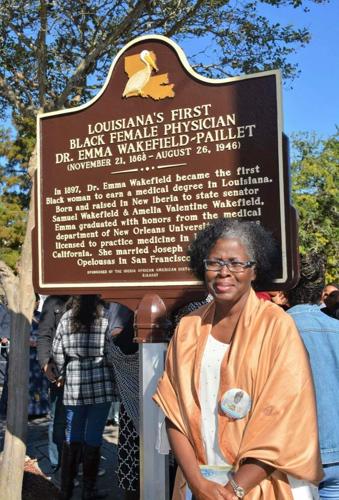While some historical accounts are definitive, many — most, even — are not. In New Iberia, Phebe Hayes is doing her best to set the record straight.
Born and raised in Iberia Parish, Hayes founded the Iberia African American Historical Society in 2017, four years after retiring as dean of University College at the University of Louisiana at Lafayette.
The society aims to fill in the gaps of not just New Iberia's history, but of south Louisiana's in general. Hayes quickly learned that there were, indeed, many holes to fill.
"One day things were very slow and I started going through some books on the shelves," she recalled. "I found one about the great doctors of Iberia Parish from, I believe, 1869-1969, but all the doctors were white, and all the doctors were male. And I knew that wasn’t true."
Hayes had grown up hearing her grandmothers talk about their physicians who were Black, "who were who were beaten and chased out of New Iberia in 1944," she said.
The inaccurate account of history made no sense to Hayes.

Banners announced the arrival of the Iberia African American Historical Society’s residency at The Shadows Visitors Center. The people on the banners are Phebe Hayes' great grandparents, Cornelius and Rosa Ella Robertson Manuel of Iberia Parish.
At heart, though, Hayes knew the reason: Jim Crow laws, and a society that was determined to exclude Black people from its history during the time when many local histories were written.
The omissions, as can be imagined, were huge.
Take, for example, the case of the area’s doctors that sparked Hayes' interest in the first place. During her research she uncovered the story of Emma Wakefield, a New Iberia native who, it turned out, was the first Black woman to graduate with a medical degree from the state of Louisiana.
The more Hayes learned about Wakefield, the more she learned about Wakefield's family and their individual stories, ones that crossed through Reconstruction and gave a deep insight into local history during one of the most tumultuous periods in American history.
"One thing I believe in is you have to understand the historical context people live in," she said. "I believe strongly that when children are taught about the Civil War or Reconstruction … they have to understand that those histories unfolded in their local communities. My question is always, 'How did this unfold in New Iberia?'"
Hayes and the historical society she founded have uncovered scores of overlooked stories. For example, Hayes discovered that when Union troops occupied New Iberia in 1863, many local Black men joined them and marched off to freedom. The stories continue through to the Jim Crow era.
Through her and the IAAHS's diligent research, several historical markers have been erected in the area. One commemorates the Howe institute, a private African-American Baptist primary and grammar school. Another notes Booker T. Washington's visit to Howe, and yet another provides a nod to, of course, Emma Wakefield.

One of the IAAHS-sponsored historical markers commemorates Booker T. Washington's visit to New Iberia in April 1915.
The IAAHS has continued to grow, opening a Center for Research and Learning in 2022 at Shadows-on-the-Teche, a former plantation home that's been turned into a museum.
Hayes is a member of a host of local organizations including The Bayou Teche Museum of New Iberia and The UL Ernest Gaines Center. Her much-anticipated book on Wakefield, written in conjunction with local poet Margaret Simon, is due to come out this fall.
Recently, she won the ULL Center for Louisiana Studies' prestigious James William Rivers Prize in Louisiana Studies. According to ULL, the award commemorated her "work as a public historian and community leader."
She said the community had been "wonderful in terms of embracing what we're doing," with support from all corners. She singled out ULL's Public History program for particular praise.
"I just found it unacceptable that so much of our history, the service and sacrifices of our people, had been written out of the official histories of this community and surrounding communities," she said. "People in your community were part of that history, they lived it. History is not something that’s isolated. It's personal."



